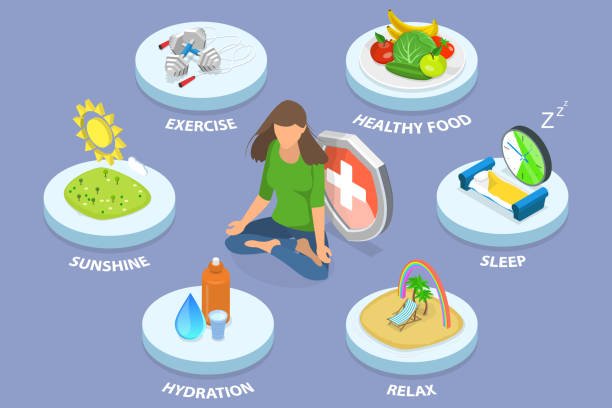In a world full of busy schedules, pollution, stress, and constant exposure to germs, supporting your immune system has never been more important. A strong immune system acts as your body’s personal defense army, fighting off infections, viruses, and harmful invaders every single day. Yet, many people don’t realize how much their lifestyle, nutrition, and habits directly affect their immunity.
Recognizing when your immune system needs help is equally vital. Frequent illnesses, chronic fatigue, digestive issues, and slow wound healing can all be signs that your immunity is struggling. Learning these signals helps you take action before small issues become serious health problems.
Most importantly, this guide will teach you how to strengthen your immunity naturally and effectively. From nutrient-rich foods and proper hydration to stress management and quality sleep, we’ll cover practical lifestyle strategies for immune system support. By understanding and applying these tools, you can build a stronger, more resilient body that fights off illnesses with greater ease and keeps you feeling your best every
Understanding the Immune System

Your immune system is a complex network of cells, tissues, and organs that work together to protect you from harmful invaders. It includes white blood cells, antibodies, the lymphatic system, spleen, bone marrow, and thymus gland.
When a virus, bacteria, or other pathogen enters your body, your immune system detects and attacks it to prevent illness. The stronger and more balanced your immune system is, the better equipped you are to stay healthy and recover faster when you do get sick.
How Does the Immune System Work?
Your immune system has two main parts: innate immunity and adaptive immunity.
- Innate immunity is your first line of defense. It’s general and non-specific, designed to quickly attack anything unfamiliar.
- Adaptive immunity is more specialized. It remembers specific pathogens, so if you’re exposed again, it can respond faster and more efficiently.
Together, these two systems create a powerful barrier against disease. However, poor nutrition, chronic stress, lack of sleep, and other lifestyle factors can weaken your immune defenses.
Signs Your Immune System Needs Support
How can you tell if your immune system is struggling? Watch for these signs:
- Frequent colds and infections.
- Slow wound healing.
- Digestive problems (like bloating, gas, or diarrhea).
- Chronic fatigue or tiredness.
- Frequent allergies or skin rashes.
- High stress levels and frequent mood swings.
If you recognize these symptoms, it’s a good idea to focus on immune system support strategies to get your body back on track.
Why Is Immune System Support Important?

A healthy immune system not only helps fight infections but also plays a vital role in preventing chronic diseases and inflammation. By keeping your immune defenses strong, you improve your resilience, energy, and overall quality of life.
Supporting your immunity means taking a proactive approach to health rather than waiting until illness strikes. By focusing on immune system support, you strengthen your body’s natural defenses before problems arise, helping you avoid unnecessary downtime and medical treatments.
A strong immune system empowers you to stay active, engage in your favorite activities, and tackle daily challenges with energy and confidence. It ensures you can keep up with work, family, and social events without constantly worrying about getting sick.
Additionally, prioritizing immune system support helps you age gracefully. It reduces your risk of chronic diseases and infections, allowing you to enjoy a vibrant, fulfilling life well into your later years.
Top 8 Tips for Immune System Support
1. Eat a Nutrient-Rich Diet
Nutrition is one of the most powerful tools for immune system support. Focus on:
- Vitamin C: Found in citrus fruits, berries, bell peppers, and leafy greens, it helps stimulate white blood cell production.
- Vitamin D: Essential for immune regulation; get it from sunlight, fatty fish, or fortified foods.
- Zinc: Supports immune cell development; found in nuts, seeds, lentils, and whole grains.
- Probiotics: Yogurt, kefir, and fermented foods help maintain a healthy gut, where a large part of your immune system resides.
- Antioxidants: From colorful fruits and vegetables, these fight oxidative stress and support overall immunity.
2. Get Enough Sleep
Your body repairs and regenerates while you sleep. Lack of quality sleep can lower infection-fighting antibodies and weaken immune responses. Aim for 7–9 hours of restful sleep each night. Establishing a bedtime routine, avoiding screens before bed, and keeping your room cool and dark can all improve sleep quality and boost immune system support.
3. Manage Stress Effectively

Chronic stress releases cortisol, a hormone that suppresses immune function over time. To support your immune system:
- Practice mindfulness or meditation.
- Engage in yoga or gentle stretching.
- Spend time in nature.
- Maintain strong social connections.
These activities help lower stress hormones and improve resilience against illness.
4. Stay Physically Active
Moderate, consistent exercise strengthens the immune system by improving circulation, reducing inflammation, and supporting healthy weight. Activities like walking, cycling, swimming, and strength training are great choices.
While regular exercise is essential for immune system support, overtraining or engaging in intense workouts without enough recovery can actually weaken your immunity. Pushing your body too hard raises stress hormones like cortisol, which can suppress immune function and make you more vulnerable to illness.
To truly benefit from exercise as a form of immune system support, it’s important to listen to your body and incorporate proper rest days into your routine. Allowing time for recovery helps your muscles rebuild and your immune system stay strong.
Ultimately, finding a balanced exercise plan that feels right for you enhances overall health, boosts energy levels, and keeps your immune defenses resilient and ready to protect you.
5. Stay Hydrated
Water is essential for overall health and plays a crucial role in immune system support. It helps transport vital nutrients to your cells, ensuring they receive what they need to function at their best. Additionally, water flushes out toxins, helping your body maintain a clean internal environment and reducing the burden on your immune system.
Dehydration can significantly impair your body’s ability to fight off infections and perform daily functions effectively. Even mild dehydration weakens immune responses and leaves you more vulnerable to illnesses.
To support your immunity, aim for at least 8 glasses (about 2 liters) of water per day, and increase your intake if you’re very active or live in a warm climate. Prioritizing hydration is a simple yet powerful step toward stronger immune system support.
6. Avoid Smoking and Limit Alcohol
Smoking damages the respiratory system and impairs immune responses. Excessive alcohol disrupts gut health and weakens immunity. Quitting smoking and limiting alcohol consumption are crucial steps for long-term immune system support.
7. Maintain a Healthy Weight

Being overweight or underweight can both negatively impact your immune function. Carrying excess fat tissue can promote chronic inflammation, which weakens your body’s ability to fight infections and recover quickly. This ongoing inflammation places unnecessary stress on your system, reducing overall immune system support.
On the other hand, having too little body fat may lead to nutrient deficiencies. Without enough essential vitamins and minerals, your immune cells can’t function properly, leaving you more vulnerable to illness.
Maintaining a healthy weight through a balanced diet and regular exercise is key for strong immune system support. By focusing on wholesome foods and staying active, you create an internal environment that helps your immune system protect and heal your body effectively.
8. Keep Up with Preventative Care
Regular health check-ups, vaccinations, and screenings are essential steps for effective immune system support. These proactive measures help catch potential health issues early, allowing for timely treatment and preventing complications that could weaken your immunity.
Vaccinations are especially important because they train your immune system to recognize and fight specific infections, providing strong protection before you encounter harmful germs.
As you age, discussing personalized vaccines and screening schedules with your healthcare provider becomes even more critical for immune system support. Tailoring these preventive steps to your individual needs ensures your immune defenses remain strong, helping you maintain an active, healthy, and resilient lifestyle throughout every stage of life.
The Role of Gut Health in Immunity
About 70% of your immune system lives in your gut. A healthy gut microbiome supports immune responses and prevents harmful pathogens from entering the bloodstream.
To support gut health:
- Eat plenty of fiber-rich foods like whole grains, fruits, vegetables, and legumes.
- Include fermented foods like kimchi, sauerkraut, and miso.
- Limit excessive sugar and processed foods that can harm good bacteria.
If needed, consult your doctor about probiotic supplements for additional support.
Herbs and Supplements for Immune System Support
Many herbs and natural supplements have been shown to support immunity:
- Elderberry: May help reduce the duration and severity of cold and flu symptoms.
- Echinacea: Often used to boost resistance against infections.
- Astragalus: Used in traditional Chinese medicine to strengthen immune function.
- Garlic: Contains allicin, which has antimicrobial and immune-boosting properties.
- Turmeric: Its active compound curcumin helps fight inflammation and oxidative stress.
While these can be helpful, always consult with your healthcare provider before starting any new supplement, especially if you take medications or have existing health conditions.
The Importance of Vaccinations
Vaccines play a powerful role in immune system support by safely training your immune system to recognize and fight specific pathogens without making you sick. They act as a rehearsal for your immune defenses, allowing your body to prepare strong responses before facing real threats.
Staying up to date on recommended vaccinations is one of the most effective strategies to maintain robust immune system support. It helps prevent serious infections that could otherwise lead to severe illness or complications.
Whether for seasonal flu, pneumonia, or other preventable diseases, keeping your vaccinations current strengthens your immunity. By prioritizing vaccines, you actively protect both yourself and those around you, supporting a healthier community overall.
How Aging Affects Immunity
As we age, our immune system naturally becomes less efficient. This is why older adults are more susceptible to infections and often take longer to recover.
Supporting your immune system as you get older becomes even more critical. Strategies include:
- Prioritizing nutrient-dense foods.
- Engaging in regular, moderate exercise.
- Staying socially and mentally active.
- Keeping up with vaccinations and health screenings.
Immune System Support for Busy Lifestyles
Many people today juggle demanding work schedules, family responsibilities, and endless social commitments. The pressure to stay productive and connected often leads to late nights, skipped meals, and high stress levels. Over time, this nonstop hustle can drain your energy reserves and take a serious toll on your overall health. Without enough time to rest and recharge, your body becomes more vulnerable to infections and chronic illnesses.
This is where the importance of immune system support truly shines. When your life is busy and overwhelming, prioritizing habits that strengthen your immunity becomes essential. Simple changes like eating nourishing meals, staying hydrated, practicing stress-reducing activities, and getting enough sleep can make a huge difference. Even small adjustments — such as taking short breaks during the day to stretch or breathe deeply — help protect and rejuvenate your immune system.
By consciously focusing on immune system support, you empower yourself to handle life’s demands with greater energy and resilience. Instead of constantly running on empty and risking burnout or illness, you build a solid foundation for long-term health. Remember, no matter how busy your schedule is, making time to support your immune system will help you stay active, strong, and better equipped to enjoy all aspects of your life.
Simple ways to support immunity even with a busy lifestyle:
- Meal prep healthy options in advance to avoid processed or fast foods.
- Keep a water bottle with you to stay hydrated throughout the day.
- Incorporate mini-breaks to stretch or meditate, reducing stress.
- Set realistic sleep goals and protect your rest as a priority.
Even small changes can make a big impact when consistently applied.
Myths About Immune System Support
There’s a lot of misinformation about immunity. Let’s clear up a few common myths:
- “You can boost your immune system overnight.”
False. Immunity builds gradually through consistent healthy habits. - “Taking high doses of vitamins prevents illness.”
False. More isn’t always better; excessive vitamin intake can actually be harmful. - “Exercise always boosts immunity.”
Partly true. While moderate exercise helps, excessive or intense workouts without rest can suppress immune function.
Understanding these myths helps you focus on strategies that truly support long-term immune health.
How Personalized Approaches Improve Immunity

Everyone’s immune system is unique. Factors like genetics, age, environment, stress levels, and medical history all influence how your body responds to threats.
A personalized approach to immune system support might include:
- Nutritional testing to identify deficiencies.
- Tailored exercise and stress management plans.
- Gut microbiome analysis for targeted dietary adjustments.
- Personalized supplement recommendations.
Working with a healthcare professional to develop an individualized plan can dramatically improve your immune resilience and overall well-being.
A Day in the Life of Supporting Your Immunity
Imagine a day designed to support your immune system:
- You start with a nutrient-packed smoothie full of berries, leafy greens, and seeds.
- You take a brisk morning walk to get your blood circulating and boost vitamin D levels.
- At work, you sip water regularly and snack on nuts or fruit rather than sugary treats.
- You take a few minutes in the afternoon to meditate and reset your mind.
- Dinner includes a colorful salad, lean protein, and fermented vegetables for gut health.
- You wind down with a book instead of screens and get to bed early for restful sleep.
These simple, intentional habits create a foundation for strong immunity every day.
Conclusion: Invest in Your Defense System
Your immune system acts as your body’s natural shield against illness, chronic disease, and the constant stressors you face every day. It is an incredibly sophisticated network of cells, tissues, and organs designed to detect and destroy harmful invaders like bacteria, viruses, and toxins. This powerful defense system keeps you healthy and helps you bounce back faster when you do get sick. Prioritizing immune system support means recognizing just how vital this system is to your overall health and longevity.
Supporting your immune system isn’t about relying on quick-fix supplements or following restrictive, extreme diets that promise instant results. While vitamins and certain herbs can help, true immune system support focuses on building a foundation of health through everyday habits. Eating a balanced diet rich in fruits, vegetables, whole grains, lean proteins, and healthy fats provides the nutrients your immune cells need to function optimally. Getting regular exercise, managing stress, staying hydrated, and prioritizing quality sleep all work together to keep your defenses strong.
Ultimately, immune system support is about creating a balanced lifestyle that empowers your body to protect and heal itself naturally. When you choose consistent, healthy habits over shortcuts, you build resilience that lasts a lifetime. By supporting your immune system in a holistic way, you not only protect yourself from infections but also improve energy, mood, and overall well-being. Investing in your immunity is truly an investment in a vibrant, active, and fulfilling life.
From prioritizing nutritious foods and restful sleep to managing stress and staying active, each small habit contributes to your body’s defense system. Think of immune system support as an investment in your energy, happiness, and longevity.
Start today. Embrace one new supportive habit at a time and build a foundation of health that keeps you strong and thriving for years to come.





